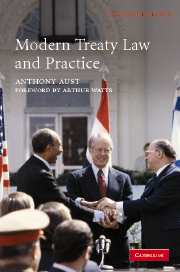Book contents
- Frontmatter
- Contents
- Foreword to the first edition by Sir Arthur Watts
- Preface to the second edition
- Articles of the Convention cited in the text
- Table of treaties
- Table of MOUs
- Table of cases
- Glossary of legal terms
- List of abbreviations
- Introduction
- 1 Vienna Convention on the Law of Treaties 1969
- 2 What is a treaty?
- 3 MOUs
- 4 Capacity to conclude treaties
- 5 Full powers
- 6 Adoption and authentication
- 7 Consent to be bound
- 8 Reservations
- 9 Entry into force
- 10 Treaties and domestic law
- 11 Territorial application
- 12 Successive treaties
- 13 Interpretation
- 14 Third states
- 15 Amendment
- 16 Duration and termination
- 17 Invalidity
- 18 The depositary
- 19 Registration and publication
- 20 Dispute settlement and remedies
- 21 Succession to treaties
- 22 International Organisations
- 23 Drafting and final clauses
- Appendices
- Index
9 - Entry into force
- Frontmatter
- Contents
- Foreword to the first edition by Sir Arthur Watts
- Preface to the second edition
- Articles of the Convention cited in the text
- Table of treaties
- Table of MOUs
- Table of cases
- Glossary of legal terms
- List of abbreviations
- Introduction
- 1 Vienna Convention on the Law of Treaties 1969
- 2 What is a treaty?
- 3 MOUs
- 4 Capacity to conclude treaties
- 5 Full powers
- 6 Adoption and authentication
- 7 Consent to be bound
- 8 Reservations
- 9 Entry into force
- 10 Treaties and domestic law
- 11 Territorial application
- 12 Successive treaties
- 13 Interpretation
- 14 Third states
- 15 Amendment
- 16 Duration and termination
- 17 Invalidity
- 18 The depositary
- 19 Registration and publication
- 20 Dispute settlement and remedies
- 21 Succession to treaties
- 22 International Organisations
- 23 Drafting and final clauses
- Appendices
- Index
Summary
The treaty becomes international law after 40 countries have ratified it.
This suggestion that all states are bound by a (multilateral) treaty once it has entered into force is a common misconception, even among diplomats. When a treaty has entered into force, it binds only those states which have consented to be bound by it. A treaty is therefore not like national legislation which, once in force, applies to all to whom it is directed. A treaty is much closer to a contract. But, if the treaty reflects (or comes to reflect) rules of customary international law, a non-party can be bound by those rules, though only as customary law. For the position of third states, see Chapter 14.
Each of the states for which a treaty is in force is a ‘party’ (Article 2(1)(g)). Thereafter it should never be referred to by the – uninformative and misleading – term ‘signatory’. But it must also be remembered that when a state expresses its consent to be bound that does not necessarily mean that the treaty will enter into force for it then: it will depend on whether the treaty is already in force for the states which have already consented to be bound, or whether further consents are needed to bring it into force. A state's consent may of course have the effect of bringing the treaty into force if it is the last one needed to do that.
- Type
- Chapter
- Information
- Modern Treaty Law and Practice , pp. 162 - 177Publisher: Cambridge University PressPrint publication year: 2007



